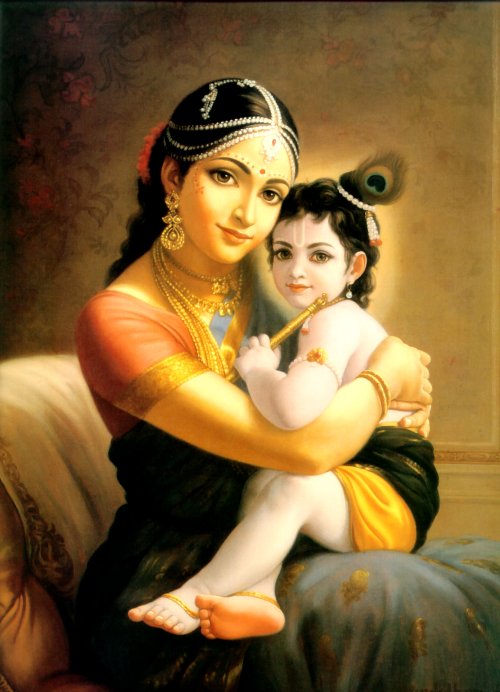The Śrī Dāmodarāṣṭakaṁ prayer with eight slokas (verses) is sung daily during the month of Damodara. This is verse 8, with purport explained by Visnujana Swami.
नमस् ते ‘स्तु दाम्ने स्फुरद्-दीप्ति-धाम्ने
त्वदीयोदरायाथ विश्वस्य धाम्ने
नमो राधिकायै त्वदीय-प्रियायै
नमो ‘नन्त-लीलाय देवाय तुभ्यम् ॥ ८॥
namas te ‘stu dāmne sphurad-dīpti-dhāmne
tvadīyodarāyātha viśvasya dhāmne
namo rādhikāyai tvadīya-priyāyai
namo ‘nanta-līlāya devāya tubhyam ॥ 8॥
namaḥ–obeisances; te–to You; astu–may there be; dāmne–unto the rope around Your waist; sphurat–splendrous; dīpti-dhāmne–unto the effulgent abode; tvadīya-udarāya–unto Your belly; atha–thus; viśvasya–of the entire universe; dhāmne–unto the shelter; namaḥ–obeisances; rādhikāyai–unto Rādhikā; tvadīya priyāyai–unto Your Beloved; namaḥ– obeisances; ananta-līlāya–unto Your limitless sportive pastimes; devāya– unto Your transcendental nature; tubhyam–unto You.
Translation
8) O Lord, the entire universe was created by Lord Brahma, who was born from Your abdomen, which was bound with a rope by Mother Yasoda. To this rope I offer my humble obeisances. I offer my obeisances to Your most beloved Srimati Radharani, and to Your unlimited pastimes.
Purport by Visnujana Swami
At the conclusion of the prayer, obeisances are offered (namas te) to the Lord’s unique binding, His bodily limbs, His associates, and to the Lord Himself, in order to arouse the mood of bhakti. Even the rope that binds His belly (damne) receives worship. That rope is the abode of, or source of, effulgence (sphurad dipti-dhamne), and the poet here suggests that the rope is also the source of the all-pervading brahman effulgence.
Then, obeisances are offered to the Lord’s belly, which is bound by this wondrous rope (tvadiyodarayatha). What is that belly like? It is the abode or support of all the infinite universes in the creation (visvasya), including all the moving and non-moving living entities dwelling therein. A gigantic lotus flower that sustains the fourteen worlds sprouts from that belly and is the abode of Lord Brahma.
Child Krishna displayed His universal form to Mother Yasoda when he opened His mouth to show that he wasn’t eating dirt; so this is another indication. Therefore, when Mother Yasoda bound His belly with rope, she bound the entire universe. Actually, Krishna allowed her to bring the entire creation under her control, although it is not possible to bind the omnipotent Lord. Therefore Vaishnava acharyas accept this pastime as the most sublime expression of vatsalya-rasa just as the rasa-lila pastime is the supreme expression of madhurya-rasa. By Krishna’s acceptance to be bound, we can understand that this pastime is inconceivable to mundane logic and reason. This is the mood here.
Obeisances are also offered to His beloved Srimati Radharani, namo radhikayai. By Sri Radha’s mercy, one is able to fully attain Sri Krishna. Being foremost amongst the gopis, obeisances are offered unto Her specifically. It is further implied that obeisances are being offered to all the gopis, headed by Sri Radha. The word, radhika, refers to the one who is perfectly engaged in Sri Krishna’s devotional service.
Therefore Satyavrata Muni says, “I offer obeisances unto Your beloved (tvadiya priyayai). She is Your eternally beloved, nitya-priya, regardless of rendering devotional service to You.” The word tvadiya further elucidates that Sri Radha is dear not only to Krishna but to all Krishna’s devotees. The understanding is that Sri Krishna is also the nitya-priya of Sri Radha. Thus, the super-excellence of Radharani’s love is proclaimed. The poet avows, “Whoever is beloved by You is worshipable for the entire universe!”
The conclusion of the prayer alludes to the supreme transcendental pastime, rasa-lila, as well as all other unlimited pastimes of the Lord. Since these topics are highly confidential, they are not mentioned directly. There is only a hint of other unlimited pastimes, ananta-lilaya. In addition, ananta-lilaya indicates that obeisances are offered to all the pastimes within the divine realm of Gokula Vrindavan. By the word devaya, the divine transcendental Lord Sri Krishna is indicated. The inference is that by Sri Damodara’s inconceivable divine qualities all the pastimes of the Lord are also transcendental. Therefore, namo ‘nanta-lilaya devaya tubhyam, “I prostrate myself unto You who are engaged in unlimited transcendental pastimes.” This is the mood expressed by Satyavrata Muni.








Speak Your Mind